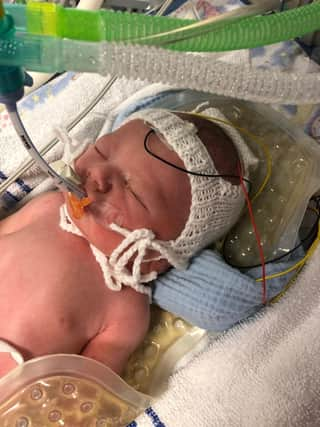Coroner calls for review of midwifery guidelines after baby's death at Worthing Hospital


Speaking at the end of a week-long inquest in Chichester, West Sussex senior coroner Penelope Schofield said clinical ignorance of a rare condition cost two-week-old Orlando Davis his life.
Orlando died on September 24, 2021, at Royal Sussex County Hospital in Brighton, due to severe hypoxic ischaemic encephalopathy – a brain injury caused by fits his mother, Robyn Davis, from Steyning, experienced during pregnancy.The fits were caused by a rare condition called hyponatraemia, brought on by a lack of sodium in Mrs Davis' blood. Mrs Davis and her family had previously accused the NHS trust responsible for her care of ignoring the symptoms of the condition during birth.
Advertisement
Hide AdAdvertisement
Hide AdAddressing the court on Thursday, March 14, Mrs Schofield concluded that, although the death 'was contributed to by neglect', 'there was a lack of understanding of this rare medical condition by midwives and clinicians' leading to 'lost opportunities' to treat Mrs Davis at home and during her admission to Worthing Hospital.The coroner also noted that medical professionals in charge of Mrs Davis’ care failed to note or properly investigate her deteriorating mental state.
In a statement, Mrs Davis had reported she felt increasingly distant and disassociated during the birth, struggling to concentrate on or meaningfully respond to her surroundings.
Midwives reported that her behaviour seemed normal for a mother in labour but the coroner noted that, until Mrs Davis was transferred to hospital, 'there had been a failure to recognise a change in [her] mental state' and 'a lack of investigation into what Robyn was saying both at home and in the hospital'. Mrs Schofield added: "She did not feel she was being listened to.”Mrs Schofield stressed no individual was responsible for Orlando’s death and she could not be certain that an earlier transfer to hospital would have changed the outcome. The coroner agreed midwives involved with the birth should have taken more accurate records of Mrs Davis' fluid intake and outtake during labour but doing so was not part of midwifery guidelines at the time, and none of the clinicians knew enough about hyponatraemia to consider it a factor."There is no normal guidance on managing hyponatraemia on pregnancy in birth,” she said. “This has been a case where there has been a gross negligence but this has come about from the cumulation of factors on events that day."Saying Orlando’s death was 'one too many', the coroner called for an urgent review of midwifery guidelines across the UK.In a statement issued shortly after the inquest’s conclusion, Maggie Davis, chief nurse at University Hospitals Sussex NHS Foundation Trust, agreed with Mrs Schofield’s call for a national review. “We wish to offer our sincere condolences to Orlando’s family once more for the unimaginable heartache and distress caused by the loss of their baby boy. As the coroner noted in her findings, hyponatraemia is an extremely rare condition which is little understood. We support her view that there is an urgent need for new national guidelines. This tragedy has deeply affected everyone involved in the family’s care, and led directly to us introducing new guidance and training within our maternity service.”